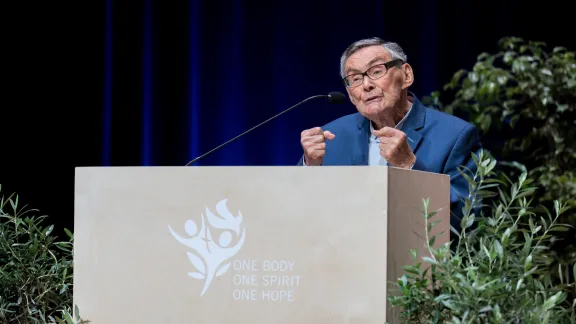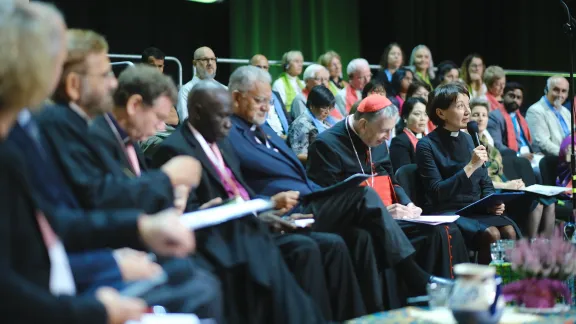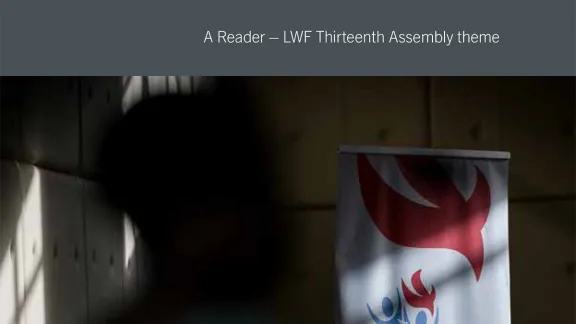Turski: Stop hate speech, antisemitism and xenophobia
Holocaust survivor Marian Turski addresses LWF’s Assembly in Kraków, urging delegates to combat hate speech and turn fear of strangers into empathy for “the other.”

Polish historian and journalist Marian Turski, a Holocaust survivor, shares his testimony with participants in the Thirteenth Assembly of the LWF, in Kraków, Poland. Photo: LWF/Albin Hillert
Holocaust survivor Marian Turski urges LWF Assembly delegates to combat hate speech, turn fear into empathy
(LWI) - Why do I keep seeing antisemitism, racism, xenophobia and the violation of human rights? Why is there still fear, prejudice, stereotyping and dehumanization of people in different parts of the globe? Those questions rang out around the congress hall in Krakow on Saturday as 97-year-old Holocaust survivor Marian Turski addressed delegates gathered for the Lutheran World Federation (LWF) Thirteenth Assembly.
Turski, a Polish historian and journalist, was imprisoned in the Łódź ghetto in 1942 and sent to the Nazi concentration camps at Auschwitz-Birkenau two years later. After the war, he worked as editor-in-chief of the daily newspaper of the Union of Polish Youth and later as a columnist for the weekly Polityka publication. His words to the LWF Assembly came the day after delegates visited the memorial and museum that preserves the memory of over a million people, mainly Jews, who were massacred by the Nazis in Auschwitz-Birkenau.
Addressing Assembly participants from around the globe, Turski said that antisemitism was “primarily a product of Christian Europe” and yet “the sting of hatred” can be experienced on different continents. He cited examples of the discrimination against Hindus in South Africa, the persecution of the Uyghur people in China and the oppression of the Rohingyas in Myanmar. “Everywhere,” he said, “we see that hate speech provides a foundation for humiliation,” therefore “we have to stop hate speech and try to understand [.…] different world views, customs, faiths and behaviors.”
“Spiritual leaders have a particular role to play” in overcoming fear and hatred of strangers.
Historian and Holocaust survivor Marian Turski
“Understanding,” Turski insisted, “is the first step towards compassion,” which is “the ability to feel with the other person.” In a world where populist governments seek to win votes by exploiting anxiety and “sowing hatred towards strangers,” he stressed that “spiritual leaders have a particular role to play” in teaching people “not to be afraid” of strangers.
Noting that this weekend marks the Jewish New Year, known as Rosh Hashanah, Turski spoke about the tradition of eating an apple dipped in honey, as Jews wish each other a new year that will be “a good and a sweet one.” As a Polish person, a Jew living in Central Eastern Europe, he asked whether those words would sound “paradoxical, grotesque, even mocking” today. Instead, he concluded with a wish for “Peace to Ukraine, may she stop experiencing aggression, peace to Europe, peace to the world.”
As Turski slowly descended the steps from the podium to a standing ovation, delegates moved into the next phase of their deliberations on the theme of “One Body, One Spirit, One Hope.” After witnessing the horrors of the Holocaust at Auschwitz-Birkenau and hearing from a survivor who still bears the scars on his body, participants will take his questions with them, as they seek to discern the way the Spirit is calling Christians to transform evil into empathy, to move from horror towards hope.


